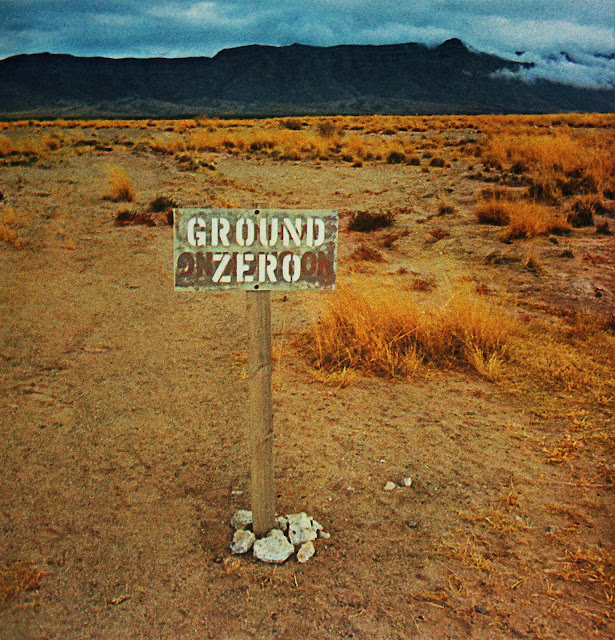But wait, you’re always going on about nukes, and now Obama has made a commitment to reduce them, but you’re still complaining!
Any reductions of nuclear arsenals are welcome, that goes without saying. The problem is rather in what is not said and not done, what is done instead – what’s really going on by means of such “small steps” is the continuing refusal of the decisive and radical step of nuclear abolition.
In the case of certain problems, the strategy of small steps is an evasion. Any reduction of carbon emissions is also, on the face of it, a good thing. But reductions that are far below the rate needed to prevent catastrophic climate change are inadequate and cynical, since they deliberately avoid the essential problem. In that sense, they are politically bogus: they give us the false comfort and security that things are being done, that our smart masters are on it, taking steps in the right direction. Thus our protests and demands for change are emptied of urgency, rendered superfluous.
Moreover, carbon trading schemes reveal what’s behind this fraudulent refusal to change the status quo of unquestioned growth: the market invents ways to capitalize on the fear and real threat of global warming. Misery rendered profitable, disaster capitalism.
Any reductions of nuclear arsenals are welcome, that goes without saying. The problem is rather in what is not said and not done, what is done instead – what’s really going on by means of such “small steps” is the continuing refusal of the decisive and radical step of nuclear abolition.
In the case of certain problems, the strategy of small steps is an evasion. Any reduction of carbon emissions is also, on the face of it, a good thing. But reductions that are far below the rate needed to prevent catastrophic climate change are inadequate and cynical, since they deliberately avoid the essential problem. In that sense, they are politically bogus: they give us the false comfort and security that things are being done, that our smart masters are on it, taking steps in the right direction. Thus our protests and demands for change are emptied of urgency, rendered superfluous.
Moreover, carbon trading schemes reveal what’s behind this fraudulent refusal to change the status quo of unquestioned growth: the market invents ways to capitalize on the fear and real threat of global warming. Misery rendered profitable, disaster capitalism.
As a technic of terror and genocide, nuclear WMDs have to be refused decisively and absolutely. In this they are like the historical problem of slavery: the liberation of any individual slave is to be celebrated, but only the radical move of abolishing slavery in toto, as an institutionalized social relation, is an adequate political solution.
In Obama’s nuclear posturing (the treaty with Russia in combination with the Washington summit), we have to recognize what he declines to do, refuses to refuse: instead of cutting the knot and pushing for abolition and a secure process of disarmamant (the real conditions for the “nuclear-free world” once lip-served), he opts to manage the status quo. He tries to preserve all existing power relations and asymmetries: a reduction of warheads, but business as usual.
Instead of a clear renunciation of the doctrine of nuclear first strike, he gives us a lawyer’s re-definiton that threatens Iran and North Korea (as signers of the NPT) with a first strike, while Israel (as a non-signer with an arsenal of some 200 nukes) gets yet another pass on its state of exception.
This confirms what Susan Watkins recently concluded in New Left Review: “The role of the [Nuclear Non-Proliferation] Treaty is to insure the nuclear privileges of the haves against the have-nots.” For NPT, read “Non-Protestation Treaty.”
The NPT is one process, among others, aiming to “lull protestation” and bring rebellious states to heel – meaning make them submit to the global order of managed imperialist rivalry, IMF and debtors prison. "Play by the rules" means the rules we dictate.
With regard to nuclear terror, the only real (as opposed to pseudo-) solution is to abolish this category of WMD without exception, a political goal that only the US could convincingly undertake to lead. In contrast, the nuclear club’s retention of member privileges against the excluded is the maintenance of a system of domination – the continuation of global class war by whatever means.
The reality, yet to be faced in political debates, is that the terror and anxiety generated by nuclear arsenals has specific enforcement functions: this terminal genocidal power of state violence, demonstrated on the civilians of Hiroshima and Nagasaki and by numerous tests in the decades following, is an ultimate deterrent to any substantive change in the given relations of domination. “If you push us too far, and really threaten our power, well, then...”
Moreover, these enforcement functions have transformed processes of "governance" in ways that further constrain and block movements for real democracy and change. These scurvy posts have often pointed to the historical mutations in the US state, which carry special weight given the role of the US war machine in enforcing the global order and insuring that changes develop along certain lines rather than others.
Let’s sum up these mutations: The security and command imperatives of the bomb, in combination with new sectors of profit, transformed a constitutional democracy (imperio-capitalist) into a pseudo-democratic national security regime (imperio-capitalist). The bomb, exerting its own needs and logics over the state as a constant pressure, generated powerful tendencies toward secrecy and increasing concentrations of executive power.
Since 1945 these tendencies transformed the constitutional balance among branches of government, creating a de facto extra-constitutional regime in which exceptional executive privileges and encroachments became normalized. This opened the way, in the Cold War conjuncture, to massive expansions of covert programs, with all the associated opportunities for abuses.
In this light, the restrictions temporarily placed on President and CIA (the prohibition on assassinations, for example) following revelations in the wake of Watergate were a brief pause, a momentary counter-tendency to bomb-generated pressures. The Reagan presidency and Iran-Contra represented the reassertion of these dominant tendencies within the US state. The Bush-Cheney neo-con regime confirmed the overall push toward increasing secrecy, surveillance and executive power, and the Obama administration now confirms its bipartisan character
A major shift in the strategic logic of the bomb following the end of Cold War bipolarity has not greatly altered or derailed this trajectory of the US national security state initiated in 1945. Many things have changed, but this hasn't. The so-called war on terror provides the needed justifications to continue the normalization of exception, permanent state of emergency, and deepening merger of war machine, science and entertainment industry.
Thirty years ago, E.P. Thompson warned us that nuclear weapons have to be grasped not as things but as social processes. Since those important debates, this problem keeps slipping from conscious attention. While much more critical work in this direction needs to be done, it’s clear that WMDs function as factors of terror within a much vaster system of social control.
To challenge the war machine at the enforcing nexus of this system is to challenge the global rule of capital. These tendencies are far more powerful than any individual politician, and the interests entrenched therein have repeatedly shown their willingness to defend their power and privilege by all means.
Obama, alone, could not have challenged these tendencies and the power they have produced. At most, he could have moved strongly to place the real problem on the agenda for genuine public debate. He did not, but without pressure from below, why should he do so, to his own risk? (There's a dialectic here, and we are naive if we wait for an invitation from power to pay attention, speak out and organize our demands into political force.)
Only states are capable of making and deploying nuclear weapons. These are beyond the means of militant groups and networks, and claims otherwise, whoever makes them, are a lie intending to terrorize. Such is the politics of fear, and Obama has accepted its terms and obligations.
A world in which states are not permitted to make and accumulate WMDs would be a more democratic and transparent world – one of radically increased possibilities for reorganizing social relations.
But a world without WMDs would have to be struggled for, from below and outside, as well as inside the state, with patience, realism and radical aim. But only thus will the rule of terror be broken; it won't be a gift from above. Evading these realities does not escape their power; the repressed returns, and all movements of emancipation will sooner or later have to face this one.
Ecological sanity and the liberation of nature, the master logic of capital accumulation, the global enforcement regime and its fantasy forms of enjoyment: all these belong to a single problematic. They are inseparable; each opens up on the other.
Susan Watkins, "The Nuclear non-Protestation Treaty, NLR 54 (Nov/Dec 2008).
Edward Thompson, "Notes on Exterminism, the Last Stage of Civilization" NLR I/121 (May/June 1980)
Raymond Williams, "The Politics of Nuclear Disarmament," NLR I/124 (Nov/Dec 1980)








Nice post, fratello.
ReplyDelete